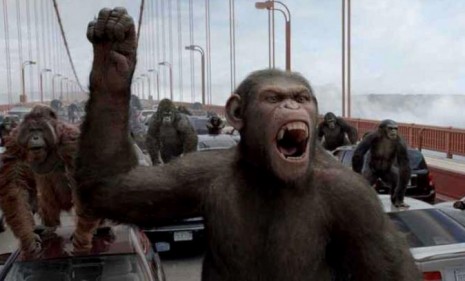Rise of the Planet of the Apes: The 'best sci-fi blockbuster of the summer'?
Critics are cheering the "dazzling," CGI-enabled performance of the film's lead ape. James Franco's turn as a scientist? Not so much

A free daily email with the biggest news stories of the day – and the best features from TheWeek.com
You are now subscribed
Your newsletter sign-up was successful
Fans of the classic 1968 film Planet of the Apes, scornful of the many ill-conceived sequels and reboots, have long wished that "damn, dirty" Hollywood would get its "stinking paws" off their franchise. Tim Burton's "murky" 2001 remake in particular might explain why critics have dreaded the latest effort, Rise of the Planet of the Apes, which hit theaters Friday. But the film — an origin story in which genetic experiments on apes lead to a dangerous level of intelligence — is being embraced. Is it, as Glenn Kenny at MSN says, "the best sci-fi blockbuster of the summer?"
Yes. The apes look "glorious": This worthy installment in the iconic series "gets more, not less, fun as it goes along," says Dana Stevens at Slate. That's chiefly thanks to the "emotional resonance" of lead ape Caesar's story arc. Aided by CGI and motion-capture technology, British actor Andy Serkis's performance is "nothing if not fleshly" (Serkis also portrayed Gollum in the final two Lord of the Rings films). And the impressive "big action climax" — a human vs. primate battle on the Golden Gate Bridge — "justifies the existence of the summer blockbuster."
"Rise of the Planet of the Apes"
The Week
Escape your echo chamber. Get the facts behind the news, plus analysis from multiple perspectives.

Sign up for The Week's Free Newsletters
From our morning news briefing to a weekly Good News Newsletter, get the best of The Week delivered directly to your inbox.
From our morning news briefing to a weekly Good News Newsletter, get the best of The Week delivered directly to your inbox.
Too bad the humans deliver such poor performances: Rise of the Planet of the Apes gets the apes "exactly right," says Michael O'Sullivan at The Washington Post. They are "both terrifying and sympathetic." But clearly, filmmakers were so focused on the apes that "they completely forgot about the people." Led by a bland James Franco and an "especially embarrassing" John Lithgow, the human cast "is uniformly weak."
"Critic review for Rise of the Planet of the Apes"
Actually, humans and apes alike deserve plaudits: For the special effects alone, "this reboot is worth watching," says Claudia Puig at USA Today. The "technical virtuosity" behind Serkis's performance as Caesar — not to mention the "humanity" with which the actor endows the character — is "dazzling." But Franco is equally "charismatic" playing the scientist who "grows to love" Caesar, and their bond lays the crucial emotional foundation for the effects-heavy film. Together, they make Rise of the Planet of the Apes "surprisingly fresh and entertaining."
"All hail Caesar and Rise of the Planet of the Apes"
A free daily email with the biggest news stories of the day – and the best features from TheWeek.com
-
 James Van Der Beek obituary: fresh-faced Dawson’s Creek star
James Van Der Beek obituary: fresh-faced Dawson’s Creek starIn The Spotlight Van Der Beek fronted one of the most successful teen dramas of the 90s – but his Dawson fame proved a double-edged sword
-
 Is Andrew’s arrest the end for the monarchy?
Is Andrew’s arrest the end for the monarchy?Today's Big Question The King has distanced the Royal Family from his disgraced brother but a ‘fit of revolutionary disgust’ could still wipe them out
-
 Quiz of The Week: 14 – 20 February
Quiz of The Week: 14 – 20 FebruaryQuiz Have you been paying attention to The Week’s news?